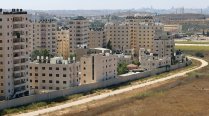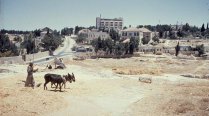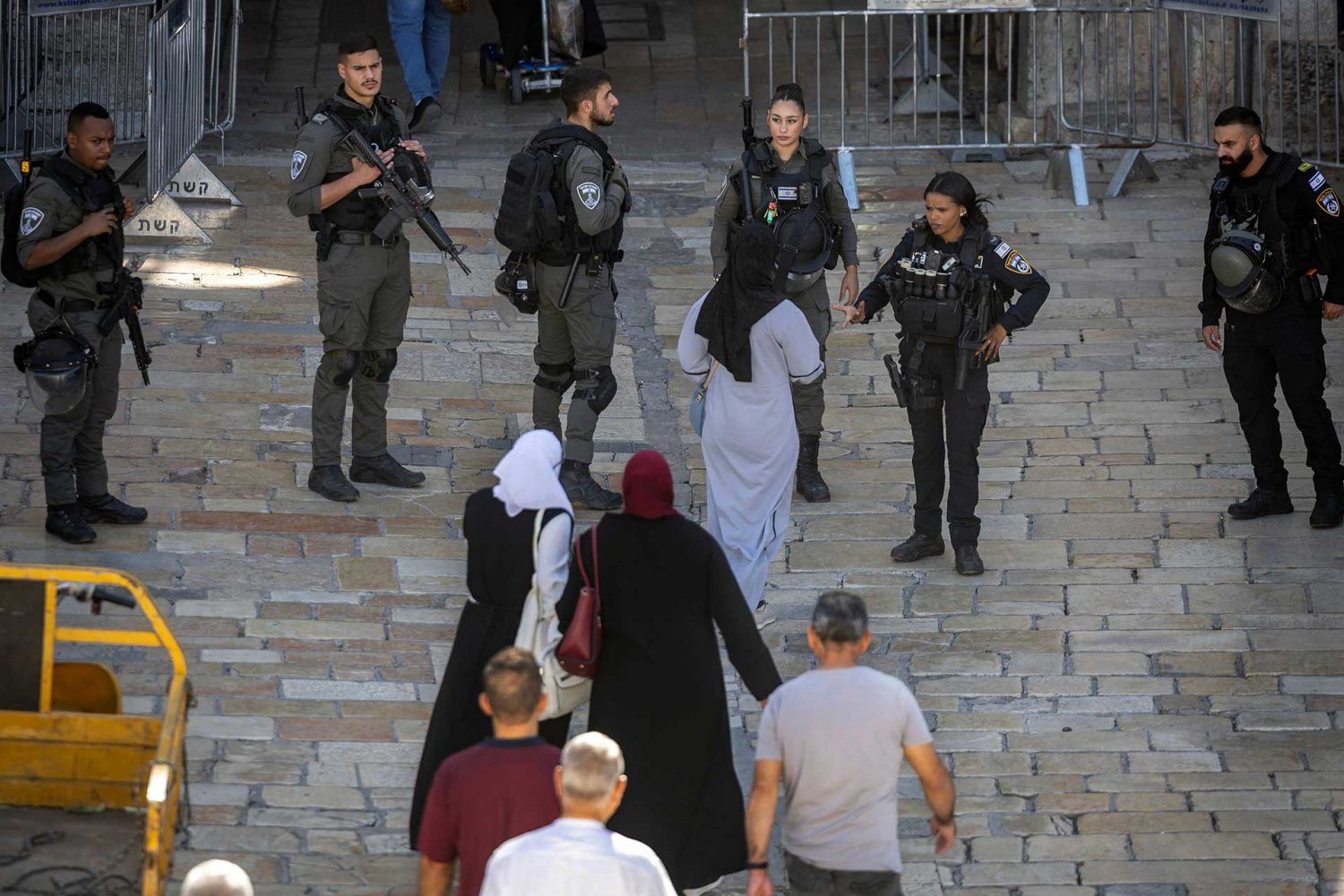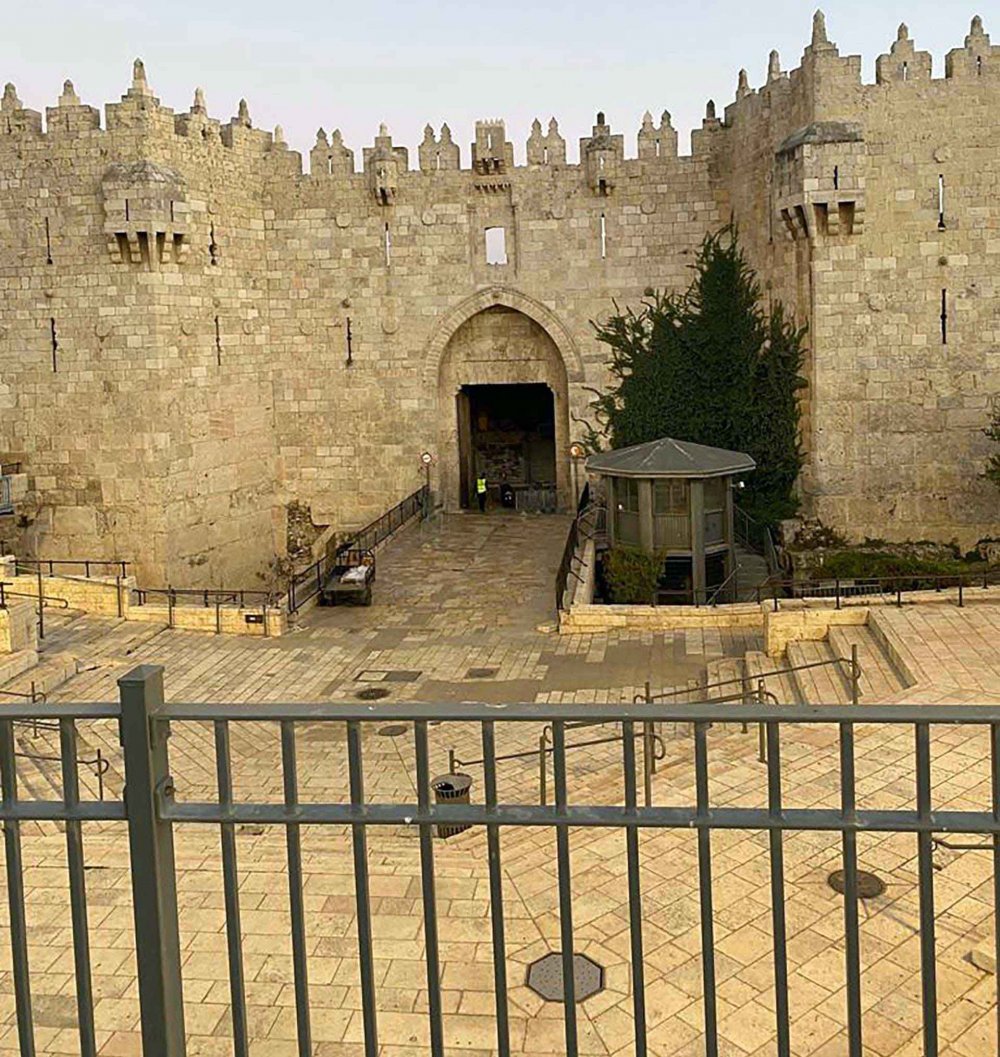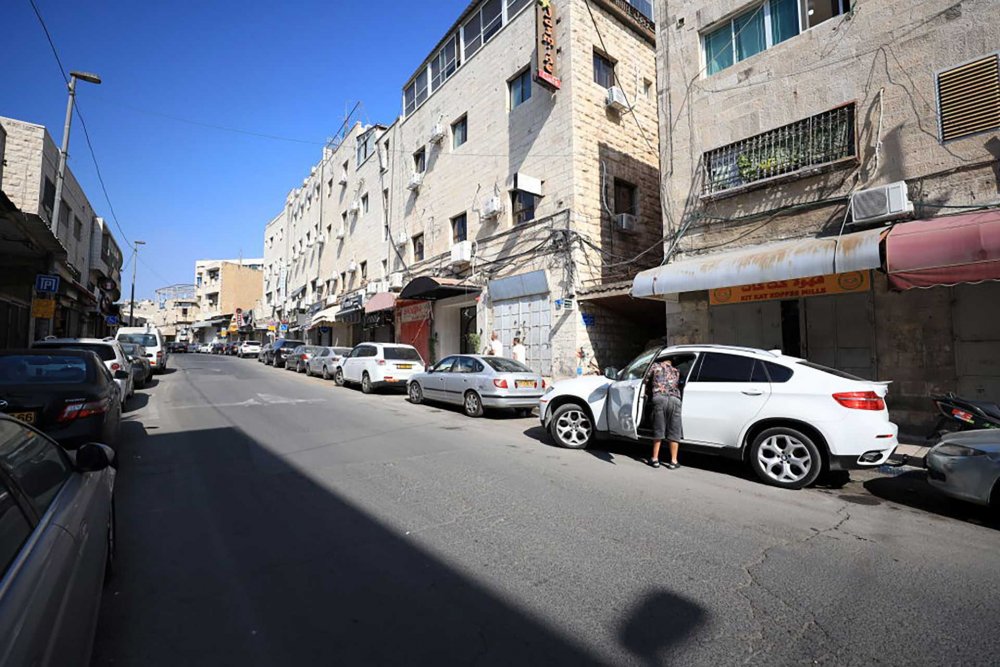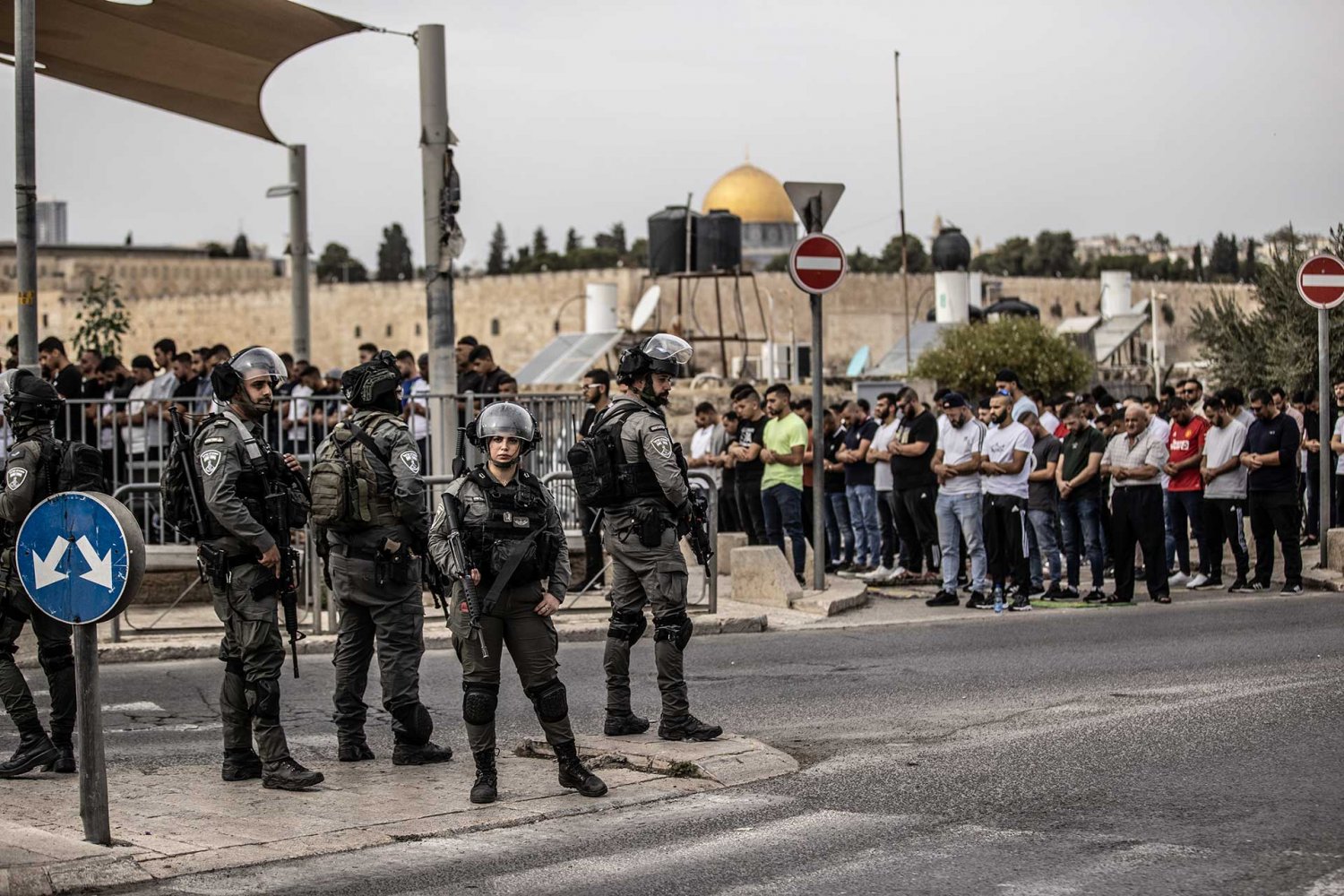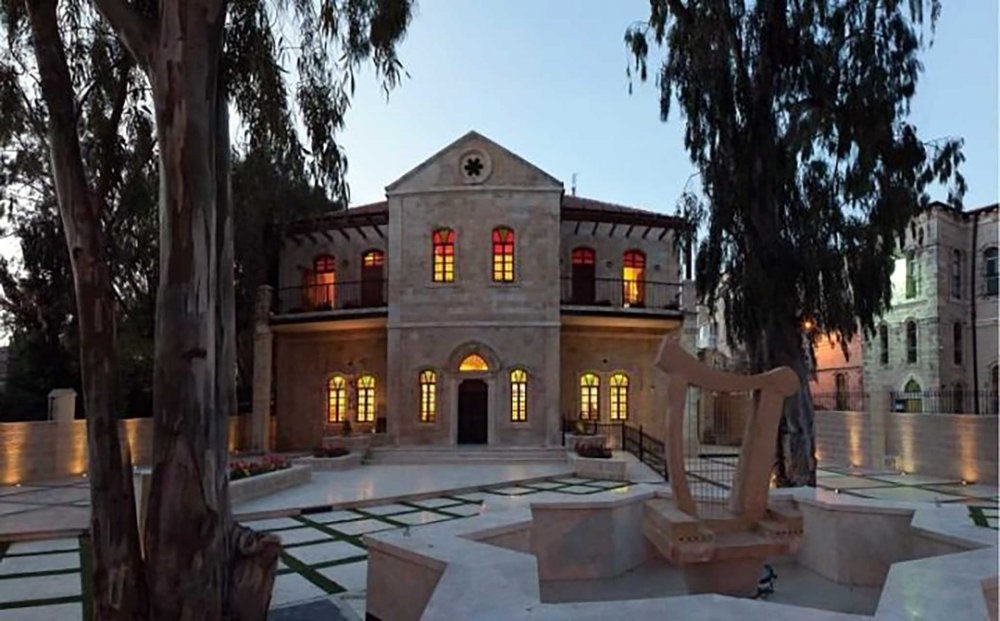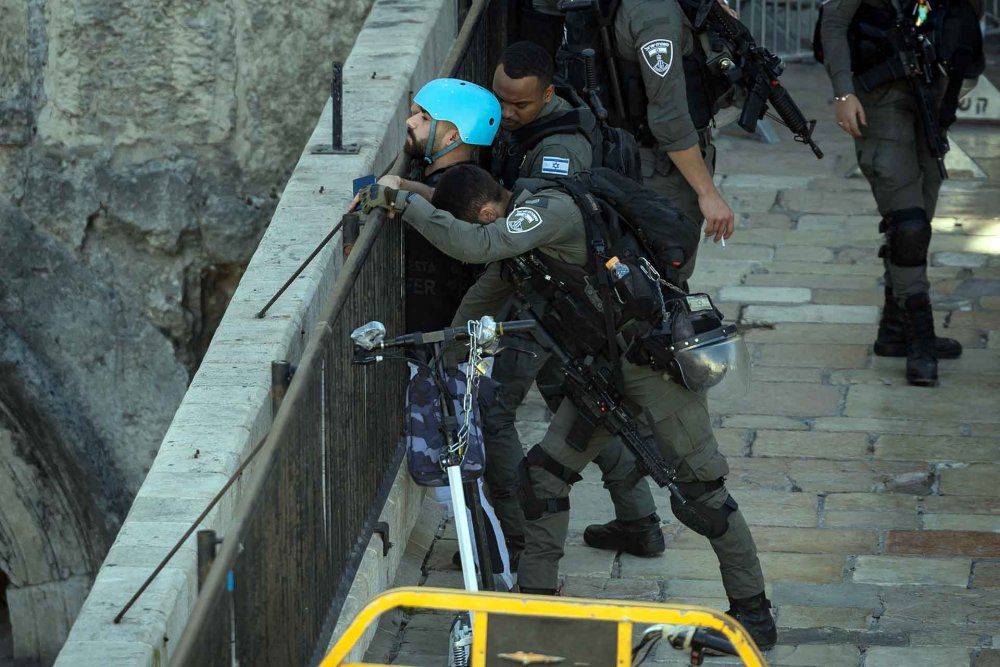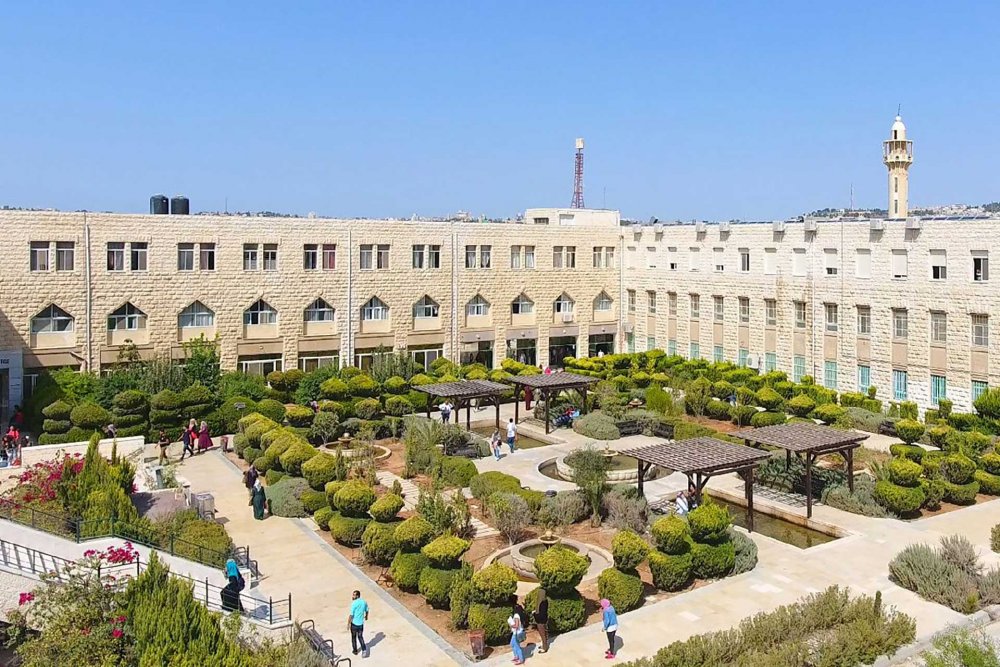Introduction
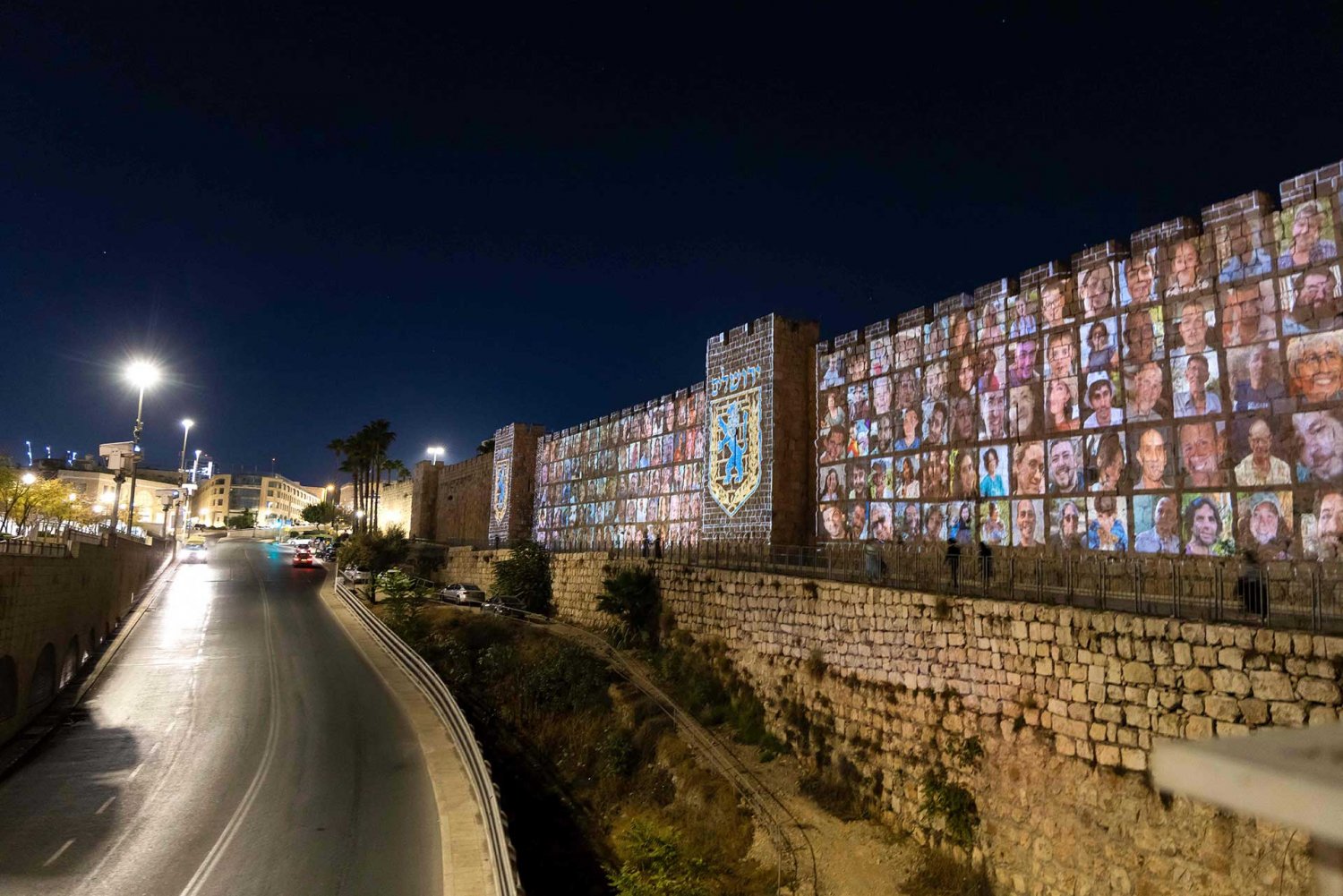
One Month On—Palestinian Jerusalemites Reflect on the War’s Impact on Their Community
Snapshot
Four Palestinian Jerusalemites who are active in their community share thoughts on how the city and their community have been affected by the cataclysmic events of October 7, 2023.
The following is the text of a Jerusalem Story Roundtable discussion that took place on November 7, 2023, exactly one month after Hamas’s al-Aqsa Flood operation and Israel’s declaration of war on Gaza.
We invited a group of distinguished Palestinian Jerusalemites to come together on Zoom and reflect on how the events of the past month have affected their community and their city:
Khaleel Assali is a member of the Jerusalem Islamic Waqf Council, publisher of the Jerusalem-centric Akhbar al-Balad website, journalist, and also a contributor to Jerusalem Story.
Simon Kouba is an architect and engineer and chair of the board of the Young Mens’ Christian Association (YMCA) in Jerusalem.
Munir Nuseibah is a lecturer on international law and director of the Community Action Center at Al-Quds University.
Margo Tarazi is the managing partner of Universal Tourist Agency Ltd.
The discussion was organized and moderated by journalist Daoud Kuttab for Jerusalem Story.
Participants’ remarks express their own views and not necessarily those of the organizations with which they are affiliated.
Roundtable
Daoud Kuttab: Thank you for agreeing to participate with us on this sad day. Today, November 7, 2023, marks one month since the events of October 7, 2023. We want to look at how the past month has affected East Jerusalem and Palestinian Jerusalemites.
We begin with a general question about your personal and professional conditions since October 7. Simon Kouba, you live in the Palestinian neighborhood of Kufr ‘Aqab [behind the Separation Wall—Ed.]. How have you been able to manage your daily commute?
Simon Kouba: I moved to Kufr ‘Aqab in 1995 when it was empty. Kufr ‘Aqab is a genuinely nice area to live in, since, being in the north of Jerusalem, it is affiliated with Ramallah and Jerusalem at the same time. Life in Ramallah—the “political capital” and the artistic capital of our region—has a lot of activity and many beautiful things, so you can be a part of this vibrant life.
But I am always in downtown East Jerusalem for work.
After the war started, it became difficult and dangerous sometimes to reach the city center, because Israel closed the only checkpoint for Kufr ‘Aqab, which is Qalandiya. The available solution is to use an awfully long road through the Ramallah villages or to drive via the Hizma [vehicular] checkpoint [for persons holding Israeli IDs and driving Israeli yellow-plated cars—Ed.]. Unfortunately, the Israeli army blocked the corridor that connects to Hizma, which is Jaba. This passage was often closed to Palestinians in the morning hours by the army to let the Jewish settlers drive in with less traffic congestion.
I usually leave my home at 8:30 a.m. Normally, I should arrive before 9:00 a.m.—we are talking about driving a distance of less than 15 kilometers—but these days, I don’t arrive before 10:00 a.m., considering the checkpoints and longer roads.
Daoud Kuttab: How much has the situation changed since October 7?
Simon Kouba: Sometimes I could not go to work. I mean, the roads were blocked; Jaba was closed; Qalandiya checkpoint was closed; all the bypass roads were blocked. Also, some days, it is dangerous. Things have been exceedingly difficult. I stopped scheduling meetings before 10:00 a.m. Yesterday, it took me two hours from Kufr ‘Aqab to reach my office near Salah al-Din Street in East Jerusalem. I went through the bypass roads. It took two hours, and I was lucky to get there at all.
There is also heavy traffic on the internal roads of Kufr ‘Aqab. Traffic is jammed without any relation to the checkpoints during the school period and because of the infrastructure. This area was built to absorb at most 10,000 human beings. Now 50,000 human beings live in it. This causes many problems.
Despite everything, Kufr ‘Aqab is a nice area to live in. I live in the northernmost part, so I am practically more in Ramallah, where there is less congestion, than in Jerusalem.
Daoud Kuttab: Munir Nuseibah, you live in the Sheikh Jarrah neighborhood. What did you have to overcome to commute to work in the Old City?
Munir Nuseibah: I live on Nablus Street in Sheikh Jarrah. The walking distance from my house to the center of the Old City, passing through Damascus Gate, takes about 20 minutes. By bike, it takes me seven minutes. I used to bike, but starting October 7, the police placed checkpoints at the gates of the Old City for Palestinians.
Most of the time, the Israeli police stop people and ask to see their ID and address. If you are not registered as being from the Old City, you will not be allowed to enter now. As a result, Palestinians were not allowed to enter the Old City. Only those whose address is in the Old City were allowed to enter on most, not all days. If your address is not in the Old City, they will ask you why you wish to enter.
On the other hand, we have heard about the arrest of young men at the Old City gates and in its alleys and streets, and of their being searched in a humiliating way. They are forced to unlock their cell phones so the soldiers can search for content. The “wrong” content leads to young people being beaten and arrested.
Since October 7, I have not been able to reach our office in the Old City, and unfortunately, this means that our work has almost stopped. We are trying to find alternative solutions. We have services in Kufr ‘Aqab. We have a service in al-‘Isawiyya. Our clinic gives free legal aid to people in these areas. We have begun to be present and announce to people that we are working out of our Beit Hanina office. Now we also need to provide services in Sheikh Jarrah, especially for the residents of the Old City, so they can reach us—because we cannot reach them. Our work normally does not include all matters related to legal services connected to arrests and detention.
Daoud Kuttab: Can Palestinians access their legal services remotely via phone on the internet? What type of complaints are you receiving? What is the biggest problem facing you since October 7?
Munir Nuseibah: We do not represent people in detention. In addition, the offices of the Israeli Ministry of Interior stopped receiving the [Palestinian] public in East Jerusalem from October 7 until today, although other Ministry of Interior offices elsewhere [which serve Jewish residents] are open.
Daoud Kuttab: That means the Israeli Ministry of Interior in Wadi al-Joz has not received people for a month?
Munir Nuseibah: They do not receive anyone; and appointments have been canceled. Therefore, if you have a new request, there is no way to get it processed. Unfortunately, this will be disruptive to people for a long time. However, family reunification stay permits are renewed automatically, like during the pandemic. They are being renewed automatically until February 2024.
While they solved the problem for the people who already hold stay permits, those who want to submit a new application—such as an application for a child registration or anything else—these were frozen, so it means that the situation we are in has hindered the normal daily matters.
We, as a legal aid center, have not entered into other issues that are outside our specialty. We know that many things need to be covered, but others cover them. What is important is the issue of arrests. We do not work on it, but we do point the public to other institutions. Israel is arresting people for posting or liking a post on Facebook and sometimes for ridiculous things. Sometimes when you use a hashtag, you can write anything dangerous on Facebook, and they do not care about it, but at the same time, they can arrest people for amazingly simple expressions. For example, I know a person who was arrested for using the Arabic expression “a paper tiger.”
Daoud Kuttab: Margo, you have a tourism office, and I am sure you have a lot of business these days?
Margo Tarazi: It’s true, it is booming‚ I cannot sleep from the huge workload! [sarcasm] But seriously, this year was strange, my loss was not as great.
Daoud Kuttab: Have you had any tourism business since October 7?
Margo Tarazi: No, my last tourism group left on October 4. I am lucky, as it also happened with the pandemic. In the first days, I was just going to the office and coming home. I was not doing any work, but my colleague in the office who lives in the Old City had a harder time getting to work. I would pick him up and drop him off by car from the New Gate. Damascus Gate, which is closer to his house in the Old City, was impossible.
Daoud Kuttab: Khaleel, congratulations on your reappointment to the Jerusalem Islamic Waqf Council. How do you describe the situation in Jerusalem?
Khaleel Assali: Yesterday, I published an article titled “East Jerusalem Is a Heart Whose Veins Were Severed, But Whose Arteries Remained.” The idea is that Palestinian East Jerusalem was isolated from her Arab surroundings, with the various neighborhoods of the larger Jerusalem governorate and the West Bank, and that they are the veins that used to pump blood into East Jerusalem, but at the same time, they kept the artery, which is the adjacent neighborhoods inside the Israeli municipal boundaries, and currently, it is very weak. The Old City has become isolated even from its adjacent neighborhoods. Every Palestinian neighborhood in East Jerusalem has become an isolated area with its own tiny commercial center where people shop to meet their needs. There is no need to reach the city center of East Jerusalem, and this is what Israel wants.
East Jerusalem has changed 180 degrees, if not more. Since October 7, the streets have been completely empty; no one is shopping or eating. I mean, at 10:00 a.m., yesterday, I was on Salah al-Din Street, in the al-Zahra area. It was empty, except for the elderly who were going to Kupat Holim clinic, or those who wanted to go to the post office.
The second thing is that the Israelis deliberately renewed the harassment of the Palestinians in East Jerusalem. I talked to a lot of guys. There is no young person who was not stopped by the Israeli police, insulted, and beaten without any reason in the past month.
I mean, for example, a week ago, there was an elderly Palestinian public servant who was stopped by the police in Sheikh Jarrah. They asked for his ID, and he gave it to them. They then asked, “Why was your hand stretched outside the car window?” He responded, “Where shall I put it?” They were provoked by his response, so they beat and beat him and his driver and everyone in the car. I mean, for no reason. This is one of the things that has made East Jerusalem very tense—people are afraid.
it is clear that if the situation continues like this, many of the shops on Salah al-Din Street and in the Old City may disappear. It is incredibly sad. There is no life. There is no movement.
All this affects the presence in al-Aqsa Mosque, which is completely isolated from its surroundings. Imagine that for four weeks in a row, only a few people performed Friday prayers in al-Aqsa. On a normal Friday, approximately 40 to 60 thousand worshippers come to pray. For the past several Fridays, the number has not exceeded 5,000, all of whom are elderly or Old City residents. It is forbidden for anyone to enter for prayer on Fridays except for those over age 60. Even the waqf employees who always come are physically searched, meaning al-Aqsa; during the morning until noon and even later, only the waqf employees are present there.
Daoud Kuttab: Are the women from the neighboring villages who used to spread out at Damascus Gate selling grape leaves and other agricultural products still coming?
Khaleel Assali: They are nowhere to be seen anymore. I saw a woman who said she had to make a lot of detours until she arrived in front of the post office, and she was selling everything at a higher price than in any other store, but people were buying from her. This is evidence of our social solidarity.
Margo Tarazi: She probably paid NIS 300 for the taxis to get to Jerusalem!
Jerusalem Institutions
Daoud Kuttab: What is required of Jerusalem institutions? I mean, Simon, you are the most senior official at the YMCA, and Munir, you work at Al-Quds University. What is required of Jerusalem institutions? Are you trying to fill the gaps? Where are we on the issue of protection or social net [to weather this crisis period]?
Khaleel Assali: There are no Palestinian institutions in Jerusalem that have the strength to withstand this, except for the Electricity Company and the Endowments (Waqf) Department. Otherwise, there is nothing, and therefore it is difficult to ask our Palestinian institutions to meet social needs; they simply don’t have the resources.
Simon Kouba: I want to address this topic in another way. We have two types of institutions in Jerusalem—youth cultural institutions and service institutions. I can talk about the first group, because I know it well. I want to talk about the YMCA. We were forced to shut the doors for our members and guests, but we kept our personnel at work. We work in all of Palestine—from the governorates of Hebron to Nablus to Beit Sahur to Jericho—all these branches are busy, and they report to the central headquarters in Jerusalem.
In the first days, of course, we did not work due to the shock. For example, we could not open the sports center, because people were unable to come. People from Silwan, who want to come, must overcome the problems on the road because of soldiers and settlers making the trip more difficult.
The Edward Said Music Institute has 70 percent attendance, not 100 percent. This has a negative financial effect, since tuition is a good part of its revenue, which pays the salaries of the teachers and administrators. Their salaries were not cut. Music professionals ought to get a good salary. We do not want the music trainer to leave us and go somewhere else.
Similarly, there are other institutions—cultural, social, and youth, for example, Yabous, which I visit every day—unfortunately, these days it is closed, and this also affects it financially, and it is possible that this effect will extend for months and perhaps years. El-Hakawati—The Palestinian National Theatre also had to close their doors. All these institutions have a sustainability problem. What can you do with these institutions?
At the YMCA, I had a meeting with the executive management to try to open our doors, even partially, to the public. Why? Because those our organization serves, their roots are neither in Beit Hanina nor in Ramallah. Their roots are in the Old City, where the most troubled and needy Palestinians live.
They need our attention on the most important things, and we want to stay open as much as we can. We need to support the local institutions, especially in the Old City. Organizations like Burj al-Luqluq. We heard from our friend Montaser (who runs the organization), and we are trying to respond, because he is in the Old City, and it is necessary to know what is happening there.
We need to survive this phase and have prospects and aspirations beyond these circumstances. In Jerusalem there are [active] people, and there is a cultural movement that still exists, and its influence is present. If we remember, during the months of June, July, August, and September, the cultural events on al-Zahra Street during the Jerusalem musical and theatrical festivals, and the groups that came from our brothers in the north and from abroad—there was a particularly good cultural scene here, and this gives us sumud (steadfastness).
Daoud Kuttab: Munir, what can Al-Quds University and institutions such as Burj al-Luqluq do? Can you tell us about the role of institutions and whether they are filling this void that we hear about? How can they improve their performance to fill the void? I heard that the Israelis are trying to close Al-Quds University. Is that true?
Munir Nuseibah: It is difficult to imagine, but there is work, and I can tell you that we are networking with Burj al-Luqluq, the Saraya Center, St. Yves, and other institutions. We held group meetings to try to design an emergency response to the situation, and we’re still thinking about it. We, as a center, told them that we’d get involved in anything related to the legal clinic—meaning anything in defense of human rights. This may be important to say here. We, as the Community Action Center and the Legal Faculty as well, from the Al-Quds University Faculty of Law, also work in international advocacy, and this is taking a key role from us these days, since few institutions in Gaza are able to work. They are paralyzed unless they have employees outside Gaza. In practice, I communicate with one young woman from two institutions in Gaza. I mean, the one who is sitting at her job is now having to work day and night. Poor woman.
We are a group of institutions that work actively. We focus on the issues of Gaza, genocide, and forced displacement. We try all forms of advocacy—including, for example, arranging visits here and abroad.
We are currently working on writing articles and holding press conferences like the ones we did yesterday about the renewal of the Nakba. We try as much as possible to not only ask about Jerusalem—in Gaza, we ask about Gaza; in the West Bank, we ask about the West Bank; in the 1948 areas, the same thing.
To work jointly, especially in this tricky situation.
In practice, we try to work collectively against the state of fragmentation. As a university, we are working via Zoom in terms of education, but we are also working with other Palestinian universities to document related violations—for example, in universities—and to share this information with the world. These activities are ongoing in terms of services. I imagine that Al-Quds University has capacity and strength in services, and we also have other respected institutions in the country, such as the Society of St. Yves and the Jerusalem Legal Aid and Human Rights Center, which provide legal services.
Daoud Kuttab: Has there been a decline in funding? Is anyone’s funding been cut?
Simon Kouba: Of course, financing is the biggest problem. Some funding has not been stopped. To be clear, I believe the request that came out at the beginning is that we will not stop what succeeded and did not fail, but certain institutions do need funding. Incidentally, the problem with funding did not just start now—it goes back five years ago, when we have also been restricted on funding due to the issue of signing the anti-terrorism pledge. Many institutions did not sign it—indeed, all the institutions I’m affiliated with did not sign that pledge. In fact, many have not signed anything like this, except for the church institutions. Switzerland recently suspended funding for nine institutions, including Israeli institutions.1 The Swiss donors are now having an internal debate about this funding suspension, because they can see that they did something wrong, and I think they will retract their decision. But the European Union system and other aid are given only to certain projects in Jerusalem, and not all the projects. It is only certain specific projects that have a specific framework and character, and not others. For example, they do not fund operating costs. I mean, if we need a one-time repair for a hall, for example, they will support it, but they won’t fund routine operation post-renovation. The same applies to salaries for administrative employees.
Daoud Kuttab: Khaleel, you said that the Electricity Company is one of the most important Palestinian institutions in Jerusalem. How was the electricity company affected?
Khaleel Assali: Since the events of October 7, its work has not stopped, because the services it provides are essential. But many of its crews were unable to reach some areas due to Israeli mobility restrictions. This affected the company’s performance in some places, especially outside the Separation Wall; for example, in specific places such as refugee camps. Some villages were subject to strict closures. This reflected negatively on the company’s performance. The company entered a condition of financial austerity and has refrained from launching new projects due to uncertainty about the future.
Daoud Kuttab: Were some generators burned?
Khaleel Assali: This is quite normal in some places. There is a feeling among Jerusalemites that whatever happens in the Gaza Strip, Jerusalem may be the next target in terms of punitive and retaliatory measures and so on. This leads to reluctance to expand or even consider future steps.
Daoud Kuttab: Margo, you are a member of the board of more than one foundation. What do you see as the role of institutions?
Margo Tarazi: I was on the board of tourism agents, but I resigned, and I am on the board of the Rawdat El-Zuhur School in East Jerusalem.
Daoud Kuttab: How are the educational conditions? What has been going on there since Oct 7?
Margo Tarazi: They reverted to study from their homes initially, and they started teaching over Zoom. Since the pandemic, everyone got accustomed to online training and to the notion of staying at home. It’s as if we’ve been conditioned to stay home. I started saying to myself, “What does it mean? I have become like a chicken in a farm. I have to break this cycle.” So I went to the office and said we should start emergency work—both for those who were cut off from their country and were afraid and for those abroad who needed help to return home. Thus, all our work has been on the emergency for the past month.
The Role of Palestinian Officials
Daoud Kuttab: What happened with the Palestinian officials? What is the role of the Palestine Liberation Organization, the Palestinian Ministry of Jerusalem Affairs in the Palestinian Authority (PA), the Jerusalem Governorate, and the Popular Committees for Jerusalem? In Jerusalem, we sometimes refer to these entities sarcastically as marja‘at, or “references.” Meaning that they suggest that no political decisions should be taken without consultation with them, but in the end, what do they do?
Khaleel Assali: I wish you would not ask this question.
Simon Kouba: The work of official Palestinian authorities in Jerusalem today has become dangerous for our local institutions. I mean, if I am going to have a celebration at the YMCA and invite Fadi Hidmi (Minister of Jerusalem in the PA), who has been one of my best friends for 25 years—If he attends, there is a great chance that the Israeli army will be coming to shut down the celebration. [Israeli law forbids the PA and other national institutions from engaging in any activity inside Jerusalem’s municipal boundaries, and considers such efforts—even on the most trivial scale—to be serious criminal offenses.2—Ed.]
Daoud Kuttab: My question is: What do they do?
Simon Kouba: What do I want from the PA, if it is not able to help me protect myself and support me financially? If I, as the head of an institution, take money from the PA, the institution will be closed by Israel. I am looking for other ways. I do not want the money now. My goal is to survive and continue.
Daoud Kuttab: Khaleel—You did not like the word “references.” Why?
Khaleel Assali: They have no value on the ground. We did not see a single plan agreed upon between them. Each one works alone. Each one tries to reduce the value of the other, and this reflects adversely on the Palestinian Jerusalemite. There is no unified movement. Frankly, I mean, even the religious authorities are not in agreement. Who are the religious authorities? This is where I express my opinion. It was a long time ago, and I wrote a lot about the Jerusalem authorities. We need something else to come out of the cloak of the so-called traditional authorities, which are the PLO’s Adnan al-Husseini or the PA’s Minister of Jerusalem Fadi Hidmi, or the Palestinian governor of Jerusalem. While all of them are on the ground, they do not provide or organize life or help anything in Jerusalem.
Munir Nuseibah: I want to say the same thing but in a different way. I imagine that the Israeli occupation, especially after the death of Faisal al-Husseini (may God have mercy on him) has succeeded in suppressing any kind of political representation, as well as the internal organization of the Palestinian community in Jerusalem, which forces us to constantly survive and move on, nothing more. When we look at our authorities, we see that they are persecuted: Our governor (a PA employee) has been under house arrest for many years, same with our minister of Jerusalem affairs, as you refer to, Simon—if you invite him to a place, he will not be allowed by Israel to participate, so you are forced not to invite him.
Once at Al-Quds University in August 2022, I remember a small youth group came and said, “We want to start doing a group of volunteer activities in the Old City.” They made our library at Al-Quds University in the Old City their headquarters. They were neither from the PA, nor from Fatah, nor from Hamas, nor from the PFLP, nor from any political group. On the same day, the Israeli forces arrived, beat them, arrested them, they took the library director to investigate the youth.
Israel is successful. Unfortunately, I would say Israel has suppressed all forms of organization [among Palestinian Jerusalemites]. Within our society, this [Israel’s suppression] has left our community without leadership or “references.” Although the PA exists, and people have their diverse interests in relation to it, it cannot be considered a national “reference.” The image that existed in the days of Faisal al-Husseini, who actually was a “reference”—that era disappeared after Faisal, and everyone is now struggling just to survive.
However, allow me to say that miracles can occur in Jerusalem without “references.” For example, in 2017, when the Israelis erected the electronic detectors at the gates of Al-Aqsa Mosque, people staged a spontaneous popular protest. This nonviolent campaign was so successful that the local leaders said that if anyone threw a pebble or a bottle of water at the Israeli police, they considered him a traitor. They reached such a level of sophistication in organizing without an organizer that they were able to stage one of the most successful protest actions that we have seen when its success was in the history of the Palestinian cause.
In February 2021, a group of young men and women from Sheikh Jarrah were joined by other people who were also able to work, not in an organized manner, but individually. They were able to do some things.
There is good in Jerusalem. I do not know if everyone always wishes that we had “references,” but there is a certain goodness that exists among the people.
No, Al-Quds University is still operating, although most of the learning occurs remotely.
Do the Churches of Jerusalem Help?
Daoud Kuttab: Margo, I know you are active in church-related issues. We talk about the authorities. Now I would like to know a little about the Christian authorities. I’ve claimed that the events in Gaza affected the Armenian Patriarch, and he retracted his decision [to go through with a controversial land lease deal in the Armenian Quarter of the Old City]. This is a particularly important development, although of course this is not the only reason he withdrew—we also saw the protests and the unity of the Palestinian Armenian community in Jerusalem every week for two years every Friday, and they brought lawyers from abroad. But my question is, do the churches play a positive or a negative role?
Margo Tarazi: I saw that they met and made a statement and said, “let us pray,” but I mean, I am sorry, as a Christian—as I am—"let us pray” is not helping. I mean, they should take a little stronger stance, but as most churches claim, what can they do? . . .
Almost every young man I talk to wishes he had a foreign passport to travel with—all our young people who have skills, experience, and master’s degrees—many but not all of them want to leave.
Simon Kouba: Of course, there is something wrong with us too. I have four children, and all four of them graduated from universities. I told them, “the one who leaves the country, I’ll have nothing to do with—I will not even pay for their plane ticket.” The four are here and they are all working. This is a cultural issue, and culture does not come from a vacuum. It comes from the father to his son or from the elder to his children.
Khaleel Assali: We, as Jerusalemites, have a family and community legacy that is difficult to leave behind, or even convince our children to do so. This forces us to stay here, in the city, even though, as you said, the city suffocates its people, but they must stay. And as Simon said, you have to find a way to live in it, because this is our homeland.
Daoud Kuttab: Jerusalem is full of journalists, but I have not yet seen any work by a specific [Palestinian] committee that tries to talk to them. Is this possible? We benefit the people of Gaza by connecting the journalists with our people in Gaza, with experts, and with local Palestinian thought leaders.
Munir: You are right, and frankly, since the beginning of this crisis, I have been a little defeated with the press.
You know, in the beginning, they started to make fun of those of us in Palestine, whether they spoke Arabic or English, and I decided at one stage that if the interview were not live, I would not participate in it with the foreign stations.
Khaleel Assali: I remember the days of the First Intifada. All the journalists were present at the Ambassador Hotel or in the American Colony Hotel, and all of them used to communicate with us, and we used to connect them with Gaza. Today, the foreign journalists seem to come here for a specific goal—they are not looking for the truth, but rather just want to use the location. The journalists often did not even leave the American Colony. They do so just so they can stand up [with a backdrop]. In my opinion, if there was a journalists’ committee in Jerusalem like we used to have, we would form a press club. Guys, we must think about how we can benefit and gain our voice in any way. This is not a question, but it is a general observation, meaning it is open to discussion.
Daoud Kuttab: Thank you all for your participation.
Notes
Erin Kilbride, “Switzerland Decides to Suspend Funding for Rights Defenders in Israel, Palestine,” Human Rights Watch, November 1, 2023.
“Law Implementing Agreement on Gaza and Jericho Areas (Restrictions of Activity) 1994,” Jewish Virtual Library, January 4, 1995.

